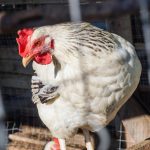Chickens are social creatures with a complex flock structure. They naturally establish a pecking order, which determines access to resources like food, water, and nesting areas. Understanding this behavior is essential for proper chicken care.
Individual chickens have distinct personalities, ranging from assertive and dominant to submissive and shy. Observing these traits helps caretakers gain insight into their needs and preferences, facilitating a more harmonious environment. Chickens possess natural instincts for foraging, dust bathing, and roosting.
Foraging allows them to search for food and engage in scratching and pecking behaviors. Dust bathing helps maintain feather health and control parasites. Roosting is a strong instinct that provides comfort and safety at night.
Providing opportunities for these natural behaviors is crucial for the chickens’ overall well-being. By accommodating these instincts, caretakers can create an enriching environment that promotes the health and happiness of their flock.
Table of Contents
- 1 Providing a well-balanced diet
- 2 Ensuring enough space and enrichment
- 3 Managing stress and boredom
- 4 Addressing social hierarchy and pecking order
- 5 Using deterrents and distractions
- 6 Seeking professional advice if necessary
- 7 FAQs
- 7.1 What are some reasons why chickens peck at feathers?
- 7.2 How can I prevent chickens from pecking at feathers?
- 7.3 What are some enrichment activities for chickens to prevent feather pecking?
- 7.4 Are there any nutritional supplements that can help prevent feather pecking?
- 7.5 What should I do if I notice chickens pecking at each other’s feathers?
Key Takeaways
- Chickens are social animals and have a natural pecking order within their flock.
- A well-balanced diet is essential for the health and productivity of chickens.
- Providing enough space and enrichment activities can help prevent boredom and stress in chickens.
- Managing stress and boredom in chickens is important for their overall well-being.
- Understanding and addressing the social hierarchy and pecking order within a flock is crucial for maintaining harmony.
- Using deterrents and distractions can help manage aggressive behavior in chickens.
- Seeking professional advice is important for addressing any behavioral issues in chickens that may arise.
Providing a well-balanced diet
Foundation of a Balanced Diet
A good quality commercial feed specifically formulated for chickens is a solid foundation for their diet. This feed provides the necessary nutrients for optimal health and well-being.
Supplementing with Fresh Fruits and Vegetables
In addition to commercial feed, it’s essential to supplement their diet with fresh fruits and vegetables, as well as occasional treats like mealworms or kitchen scraps. This provides a varied and nutrient-rich diet that supports their overall health.
Meeting Specific Nutritional Needs
It’s also important to consider the specific nutritional needs of different types of chickens. For example, laying hens require a higher level of calcium to support egg production, while growing chicks require higher levels of protein for proper growth and development. By understanding the nutritional needs of your chickens at different life stages, you can ensure they receive the appropriate diet to support their health and well-being.
Ensuring enough space and enrichment

Chickens require adequate space to move around and engage in natural behaviors. Overcrowding can lead to stress, aggression, and health problems within the flock. Providing enough space both indoors and outdoors is essential for the well-being of chickens.
The general rule of thumb is to provide at least 2-3 square feet of space per chicken in the coop, and at least 8-10 square feet of space per chicken in the outdoor run. This allows chickens to move around freely, stretch their wings, and engage in natural behaviors such as dust bathing and foraging. In addition to providing enough space, it is important to provide enrichment activities to keep chickens mentally and physically stimulated.
Enrichment can include items such as perches, dust bathing areas, hanging treats, and even simple toys such as mirrors or hanging objects. These enrichment activities can help reduce boredom and stress within the flock, as well as promote natural behaviors. By ensuring enough space and providing enrichment activities, you can create a more stimulating environment for your chickens.
Managing stress and boredom
Stress and boredom can have negative effects on the health and well-being of chickens. Stress can be caused by factors such as overcrowding, changes in the environment, or predator threats. Boredom can result from lack of stimulation or inadequate enrichment activities.
It is important to manage stress and boredom within the flock to ensure the overall health and happiness of the chickens. One way to manage stress and boredom is by providing a stimulating environment with plenty of space and enrichment activities. This can help keep chickens mentally and physically engaged, reducing the likelihood of boredom and its associated negative effects.
Additionally, providing a secure and predator-proof coop and run can help reduce stress from external threats. By creating a safe and enriching environment, you can help minimize stress and boredom within the flock.
Chickens have a natural instinct to establish a pecking order within their flock. This social hierarchy determines access to resources such as food, water, and nesting areas. It is important to understand this behavior and address any issues that may arise within the pecking order.
In some cases, aggressive behavior or bullying may occur within the flock, which can lead to stress and injury among the chickens. One way to address social hierarchy and pecking order issues is by providing multiple feeding and watering stations to reduce competition for resources. This can help lower the likelihood of aggressive behavior during feeding time.
Additionally, providing enough space and enrichment activities can help reduce stress within the flock, which may in turn reduce aggressive behavior. By addressing social hierarchy and pecking order issues, you can create a more harmonious environment for your chickens.
Using deterrents and distractions

Identifying the Need for Intervention
In some cases, aggressive behavior or bullying within the flock may require intervention to prevent injury or stress among the chickens.
Using Deterrents to Reduce Aggression
Using deterrents such as visual barriers or temporary separation can help reduce aggressive behavior within the flock. Visual barriers can be used to temporarily block line of sight between aggressive birds, which can help reduce confrontations. Temporary separation can also be used to give bullied birds a chance to recover from any injuries or stress caused by aggressive behavior.
Redirecting Aggressive Behavior with Distractions
In addition to using deterrents, providing distractions such as hanging treats or toys can help redirect aggressive behavior and reduce boredom within the flock. These distractions can help keep chickens mentally and physically engaged, reducing the likelihood of aggressive behavior.
Effective Management of Aggressive Behavior
By using deterrents and distractions when necessary, you can help manage aggressive behavior within the flock.
Seeking professional advice if necessary
If you are experiencing ongoing issues with aggression or bullying within your flock, it may be necessary to seek professional advice from a veterinarian or animal behaviorist. These professionals can provide guidance on how to address specific issues within your flock and offer recommendations for managing aggression or bullying. They may also be able to provide insight into the underlying causes of aggressive behavior within your flock and offer tailored solutions to address these issues.
In some cases, professional intervention may be necessary to ensure the health and well-being of your chickens. If you are unsure about how to address aggression or bullying within your flock, seeking professional advice can provide valuable support and guidance. By working with professionals who have experience in poultry behavior and welfare, you can develop a plan to address aggression or bullying within your flock effectively.
In conclusion, understanding the behavior of chickens is essential for providing proper care for these social animals. By recognizing their natural instincts and behaviors, you can create a more enriching environment that supports their health and well-being. Providing a well-balanced diet, enough space and enrichment activities, managing stress and boredom, addressing social hierarchy and pecking order issues, using deterrents and distractions when necessary, and seeking professional advice if necessary are all important aspects of caring for chickens.
By taking these factors into consideration, you can create a harmonious environment that promotes the overall health and happiness of your flock.
If you’re looking for ways to keep your chickens from pecking at each other’s feathers, you may want to consider investing in a Producers Pride Sentinel Chicken Coop. This coop is designed to provide ample space for your chickens to roam and explore, reducing the likelihood of pecking behavior. According to a related article on Poultry Wizard, the design of the coop includes features that promote healthy and happy chickens, ultimately reducing the risk of feather pecking. Check out the article here for more information on how this coop can benefit your flock.
FAQs
What are some reasons why chickens peck at feathers?
Chickens may peck at feathers due to stress, boredom, overcrowding, nutritional deficiencies, or as a result of a pecking order within the flock.
How can I prevent chickens from pecking at feathers?
To prevent chickens from pecking at feathers, provide a spacious and enriching environment, ensure a balanced diet with adequate nutrition, and address any potential sources of stress within the flock.
What are some enrichment activities for chickens to prevent feather pecking?
Enrichment activities for chickens can include providing access to a variety of perches, dust baths, toys, and foraging opportunities. Additionally, rotating their environment and introducing new objects can help prevent boredom and reduce the likelihood of feather pecking.
Are there any nutritional supplements that can help prevent feather pecking?
Supplements such as poultry grit, oyster shell, and probiotics can help ensure that chickens receive the necessary nutrients to maintain healthy feathers and reduce the likelihood of feather pecking.
What should I do if I notice chickens pecking at each other’s feathers?
If you notice chickens pecking at each other’s feathers, it is important to address the underlying cause, such as stress or overcrowding. Separating the affected chickens, providing additional enrichment, and ensuring a balanced diet can help prevent further feather pecking.
Meet Walter, the feathered-friend fanatic of Florida! Nestled in the sunshine state, Walter struts through life with his feathered companions, clucking his way to happiness. With a coop that’s fancier than a five-star hotel, he’s the Don Juan of the chicken world. When he’s not teaching his hens to do the cha-cha, you’ll find him in a heated debate with his prized rooster, Sir Clucks-a-Lot. Walter’s poultry passion is no yolk; he’s the sunny-side-up guy you never knew you needed in your flock of friends!







